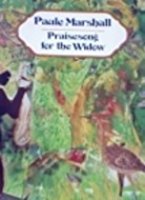courtesy of a special order from Auntie’s Bookstore
PRELUDE: Years ago, our manager at the bookstore was a man who had parachuted into Grenada during the U.S. invasion of that Caribbean Island. I never understood why. He couldn’t explain it! This book won’t tell you, but Wiki says it was to prevent Grenada from becoming BFFs with Fidel Castro. They would have been his neighbor. They’re in his hood.
But the U.S. invaded and saved the day. So now, Grenada’s healthcare sucks and poverty is rampant. You know, good old capitalism. Way to go, USA. I feel it is adding insult to the injury caused by bringing Africans from all over that continent to Grenada as slaves originally.
Praisesong for The Novel
 A black American called Avey Johnson goes on a cruise with two friends (but one is more like a frenemy, or maybe an annoying relative!) I didn’t understand why they were friends. Anyhoo…
A black American called Avey Johnson goes on a cruise with two friends (but one is more like a frenemy, or maybe an annoying relative!) I didn’t understand why they were friends. Anyhoo…
Unsettled by dreams, Avey gets off the ship by herself and decides to “go native”. She meets an old man in a rum shack who takes her on “the Excursion” to Carriacou–a yearly pilgrimage that people who live in Grenada always make back to their home island. Because of the way Avey looks, people keep mistaking her for a Grenada native, and speaking to her in Patois, which, as New Yorker, she cannot understand.
She’s violently ill on the boat, purging herself of many things, then experiencing a kind of rebirth on the island as she is bathed like a baby by the old man’s daughter, and given healing herbs and made whole again. Well again.
For Lo, the Past Ye Shall Always Have With You

Avey dreams of her grandmother, a mystic who lived in South Carolina and was more like these islanders than either of her parents. Her grandmother used to tell her a tale of a slave ship arriving in South Carolina full of Nigerians, and how they came ashore and then just turned and walked away, back over the water.
I kept thinking the whole book was an allegory, the scenes a mixture of those times and these times, and it was so skillfully done. This author has a very light touch. I was thinking slavery and sugarcane, colonial masters and plantations, tribes living close to the earth in Africa and close to the water on the islands. Black life now, black life then. City people and country people. And a drumbeat connecting them all.
A Small Scene
 Here’s Avey running into the old man as he’s closing the rum shop to go on The Excursion. She’s just about gotten sunstroke/heatstroke from walking too far down the beach from her hotel without any water:
Here’s Avey running into the old man as he’s closing the rum shop to go on The Excursion. She’s just about gotten sunstroke/heatstroke from walking too far down the beach from her hotel without any water:
“And what you is? What’s your nation? He asked her, his manner curious, interested, even friendly all of a sudden.
“Arada? Is you an Arada? He waited.
“Cromanti maybe? And he again waited. “Yaraba then? Moke?
“On and on he recited the list of names, pausing after each one to give her time to answer.
“Temne? Is you a Temne maybe? Banda?
 “What was the man going on about? What were these names? Each one made her head ache all the more. She thought she heard in them the faint rattle of the necklace of cowrie shells and amber that Marion [her daughter] always wore. Africa? Did they have something to do with Africa? Senile. The man was senile. The minds of the old…
“What was the man going on about? What were these names? Each one made her head ache all the more. She thought she heard in them the faint rattle of the necklace of cowrie shells and amber that Marion [her daughter] always wore. Africa? Did they have something to do with Africa? Senile. The man was senile. The minds of the old…
“She darted a frightened glance toward the door. She might be safer out in the sun.
“Manding? Is you a Manding like my mother, maybe? The Long-Foot People, we calls them.
“Wait! A smile began to work its way through the maze of lines around his mouth. Don’ tell me you’s a Chamba like myself…? He waited, the smile slowly emerging, his arms in the frayed shirt poised to open in a fraternal embrace.
“…I…I don’t know what you’re talking about…I don’t know what you’re asking me…
“I is asking if you’re a Temne, Mono, Arada or what? He had lost patience with her once again…”
WHY I LOVED IT
I love this scene because it’s funny, but it’s also deep. The old man sees that she looks Island, and thinks she is from there (which she is, but only several generations ago). She’s American now. She has the American attitude towards the old–not that they’re wise, as the old man proves to be, but that they’re senile, which makes her afraid of him!
I love the recitation of the tribal names (and the dance that he urges her to go to after the Excursion, which the remaining tribal members doing their special stomping around). I enjoy finding out about groups of people and languages new to me. This book felt natural. It’s not preachy, but it is sometimes melancholy, as any history about a person, no, a people, cut off from their roots has to be. It’s easy to read, and easy to enjoy.
Rating: 5 Carribean Stars!




